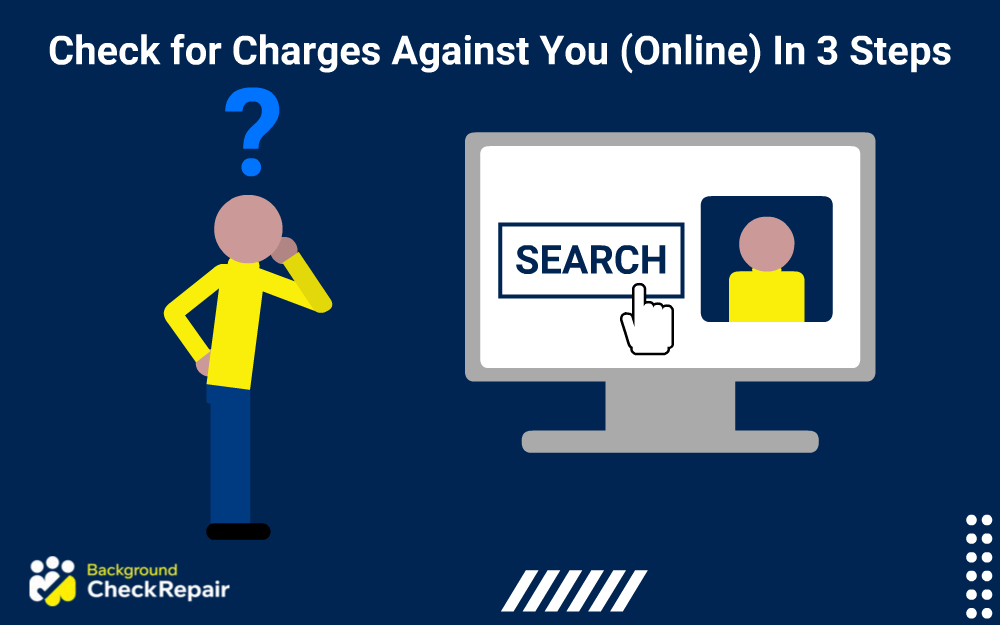We use cookies to ensure that we give you the best experience on our website. If you continue to use this site we will assume that you are happy with it
Check for Charges Against You (Online) in 3 Steps
 Written by Background Check Repair
Written by Background Check Repair
Criminal Records | June 17, 2024

Table of Contents
Whether it’s for curiosity’s sake or getting ready for a job interview, it may be worthwhile to check for charges against you. Fortunately, almost anyone can perform this type of criminal history search and verify criminal charges that have been filed in just three steps using the internet.
In fact, there are a number of different options available to check for charges against you, such as online databases and local court clerks that have resources that can help individuals who are hoping to find out if any charges have been filed against them.
Check for Charges Against You Online
Various state and police databases can be utilized to find useful information about any charges that were filed, when they were filed, and why. In fact, the process is very similar to how to locate an individual’s criminal history.
The exception to the rule is when the charges are related to a sealed indictment. In that (rare) case, the indicted suspect will not have any way to find out about the charges until they are arrested.
Also, the level of crime helps dictate the timeframe for the police to press charges, so that should also be taken into consideration.
Using Online Databases
In most cases, using an online database is the quickest and easiest way to check for charges against you. Not only are these databases easy to access, they are also updated frequently, so any charges (even charges that get dismissed and dropped charges) that are filed should be available on the databases as soon as they are processed by the court system.

Generally, criminal charges are held in a state database. Detailed steps for how to navigate state criminal databases and perform a search are outlined below.
So, ‘how do I verify my criminal charge status?’
Step 1: Identify the State’s Online Criminal Record Keeping System
Unfortunately, there is not one single way to check for charges in the United States. Unless there are federal crimes being charged, the charges will be filed at the state level.
Since every state has different regulations and laws surrounding how this information is kept and how it is released, the exact method to find this information will vary from state to state.
The first step in the process is to visit the state’s Department of Justice website for more information. On this website, there should be information for how records are kept, as well as how and who has access to certain criminal and police records.
The following list provides links to the justice department website of each state.
Step 2: Access Court Records
For most states, the information for criminal charges that have been filed in court is available through the state court system.
This information is housed in a number of ways, but each state’s Department of Justice website will have information about whether or not this information is held in an online database. If it is, proceed to the next step.
If court records are not accessible via an online database, contact the county clerk or the clerk of the court where the charges were filed to learn how to access this information. (Usually, it simply requires filling out a form, paying a fee, and waiting for the results.)
Step 3: Perform a Name-based Search
If the state has a searchable online database, such as the remote access offered by the California Courts, the next step is to perform the search itself.
For each search, various information will be needed. This information ranges but the name of the individual being searched is required at the bare minimum. In some cases the court that the charges were filed will also be necessary to perform a search.
An example of how to perform a search in California is outlined below.

Example: To perform a search in California, first navigate to the “Find Your Court,” page of the California Courts website.
Next, select the superior court for the county where the charges were filed, such as Amador County.
From here, select “Case Search,” from the Amador county superior court website’s homepage.
Finally, enter in the applicable information and perform the search.
There are a number of different ways to perform the search such as; case number, name, as well as case type and case status to help narrow down the process.
How To Check if Charges Have Been Filed By Police
Besides searching court records, there is also the option to check for charges against you that have been filed by the police. Since the police department is often the one who files reports that ultimately lead to a prosecutor filing criminal charges, much of the important information regarding how to search for charges on someone can be found through the police department.
As with searching court records for criminal charges, state and local laws will play a major role in what information is available to the public and how this information is accessible. Although the process is generally the same across most states, some jurisdictions have laws that will interfere with an individual’s ability to perform a search on someone else.
For more information on how to access police records for each state, use the list below to find information for a specific state.
Step 1: Identify the State Police Online Record Keeping System
The Freedom of Information Act makes all police records in the county public information. Although anyone can request this information at any time, the jurisdiction will determine how these requests are made.
In most cases, there will be a section of the state police website that mentions making a “freedom of information act request,” a warrant search option, or a “search for charges” option.
Step 2: Make a Freedom of Information Act Request or Search for Charges
Once the particular police department’s method for obtaining the police report is discovered, the next step is usually as simple as following the guidelines set by that particular department. In most cases this will be an online system where individuals enter information about the person the charges refer to, as well as their own information and any required payments to perform the search.
Keep in mind that there are various reasons which can lead to requests not being completed, usually because of laws surrounding what information is public information. For example in many situations, if the case is still active, only those involved in the case may request information.
In most situations, an information act request for a case that has already been closed can be made by anyone, even if they were not involved.
An example of how to submit a freedom of information act request in New York is outlined below.
New York Charges Request Example: Navigate to the New York State Police website.
Next, scroll down to the section titled “request records” and select ‘Learn More’
Select FOIL request on the records request page.
Follow the steps outlined for how to submit a Freedom of Information act request online, in-person, or by mail.
What Happens When Charges are Filed?
In order to understand why charges may have been filed against an individual, it’s important to understand why charges are filed at all. First, only criminal charges are filed through a prosecutor. This means that misdemeanors, such as jaywalking or speeding tickets, will not result in criminal charges.
Generally, criminal charges are brought against an individual following the review of information from a police report, or following a complaint from a private citizen that will lead to an investigation before charges are filed by the prosecutor.
Although private citizens can make a complaint that may eventually lead to criminal charges, a private citizen is not able to file charges themselves, as this is a power reserved by law for the prosecutor.
Once charges have been filed, they are entered into a state database and the pre-trial phase begins. In New York, the state makes it easy to check if someone is in Central Booking, while other states generally start the process with the sheriff’s office.
It is during this phase that both the defendant and prosecuting lawyers will begin deliberations that will ultimately be settled between them or by a judge. Criminal trials can be a confusing and drawn out process. Individuals who have had criminal charges filed against them should contact a criminal attorney, who will be able to guide them through the complicated legal process.
Stop Criminal Conviction Records: Finding a Criminal Defense Attorney
In some cases, charges that have been filed against an individual can be sealed or expunged. Laws for how and what records can be sealed will depend on the jurisdiction where the crime took place, however many jurisdictions do not allow records to be sealed under any circumstances.
However, there are a number of situations where a jurisdiction may consider sealing records, such as:
- Situations where an individual was arrested but not charged with a crime (how to discover recent arrests in your vicinity).
- Situations where a case was dismissed.
- A diversion program was completed.
Using a Criminal Defense Lawyer to Expunge Records
If the check for charges against you yields results that may be in error, there are a number of options are available. Likewise, the process for hiding juvenile records is typically outlined by state law, as well, providing an effective solution for expunging records. However, in either case, contacting a criminal defense lawyer is the first step in the process.
A criminal defense lawyer will examine the circumstances and facts of the case and determine if sealing or expunging records is possible, given the crime and jurisdiction where it took place. Although some jurisdictions allow individuals to file petitions to seal records, it is always a good idea to talk to a lawyer first, as they have a better understanding of the complicated legal process.
With online databases becoming more and more common, searching criminal history information on an individual is faster and easier than ever. By understanding the local laws surrounding public records, the process to check for charges against you can be completed almost instantaneously.
